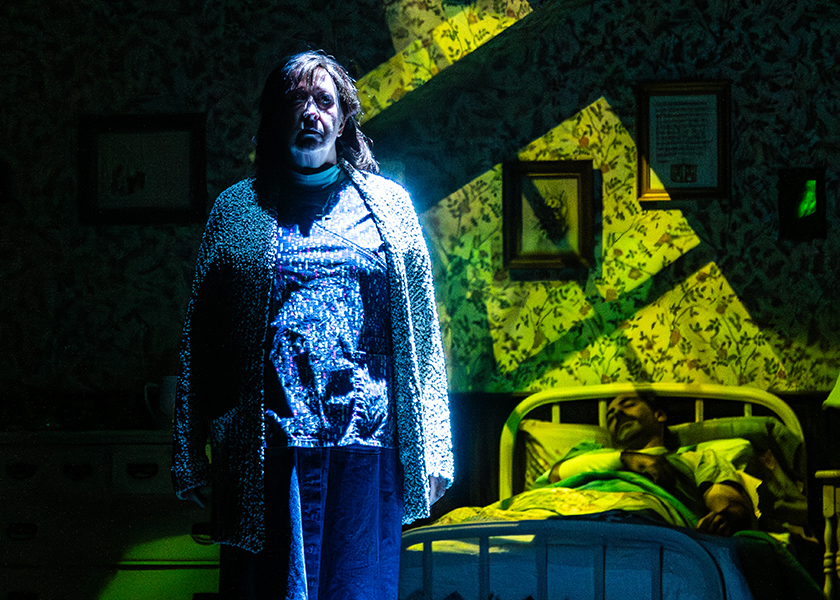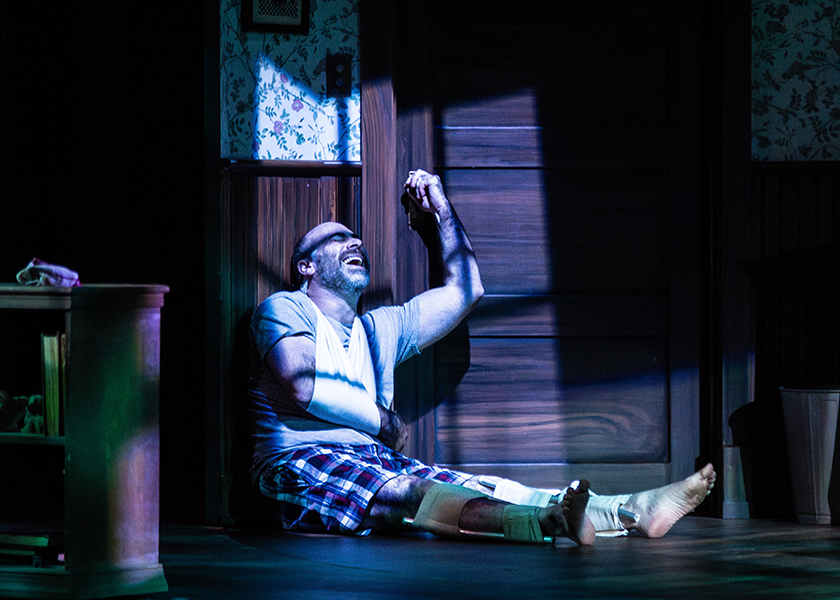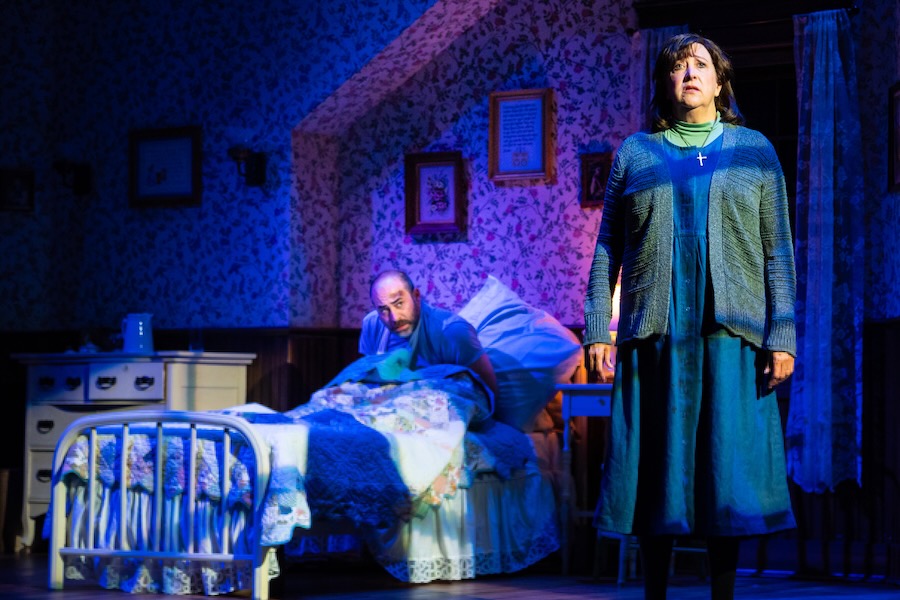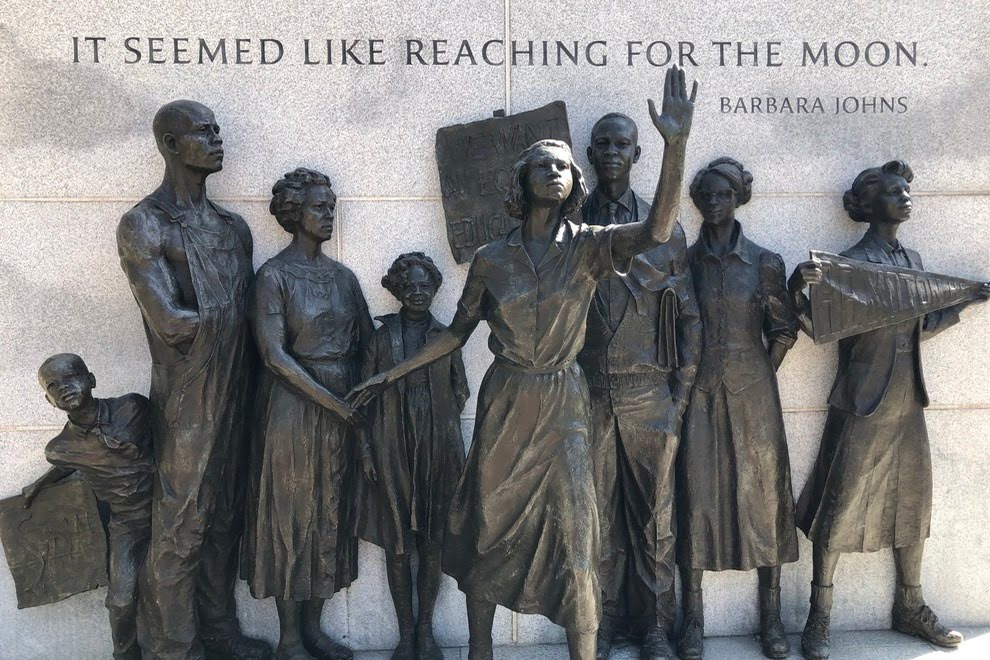There’s finally a chill in the air in Richmond, and Virginia Rep is ushering in the fall with an iconic horror story inspired by the pressure to write horror stories. Stephen King’s 1987 novel Misery repackaged the author’s angst at feeling pigeonholed as a genre fiction writer into a twisted study of the dynamic between a writer and his self-proclaimed number one fan. This stage adaptation for Misery was written by William Goldman, who also penned the screenplay for the 1990 film of the same name.
It’s been at least a decade since I’ve seen Misery onscreen, and while I remembered a compelling plot and main characters, I was surprised and delighted to realize how smart this pick is from Virginia Rep, and how thematically rich and resonant the story is right now.
Misery is gripping entertainment, and it’s also an excellent entry point into conversations about the things readers and authors demand from each other. It explores fandom and parasocial relationships by taking these things to their extremes. Ideas about purity, taste, and the push-and-pull between elitism and populism in commercial art permeate the story. Though I thought these themes were fascinating and timely, I felt they were sometimes undermined by the script: Does Misery really require hammy asides and jokes? Do we strive to understand Annie as a complex character or laugh at her as an unsophisticated prop in Paul’s story? By providing expository information too clearly and too early, I wondered if the stage script had minimized opportunities for suspense and drama as the story unfolds.
Beyond these textual qualms, there are a lot of excellent parts of this production that enhance the story’s strongest qualities and make Virginia Rep’s Misery an entertaining ride. The clever introduction sets the audience at ease – then the production uses the total darkness of the November Theatre to great effect to force-restart the room’s atmosphere. Phenomenal lighting and projection design by BJ Wilkinson and Dasia Gregg, respectively, contribute to the storytelling at every turn. These visual elements add a lot of texture and communicate important information about mood and the passage of time. Even warm light is utilized in ways that feel disconcerting and eerie, making the house somehow feel especially dark and abandoned at night. Joey Luck’s sound design enhances the sense of dread with humming and thrumming. Those droning noises are thoughtfully balanced with moments of complete stillness and silence, which are even more anxiety-inducing.

Strong Performances from Sanford and Meixler in Virginia Rep’s Misery
With few characters and even fewer settings introduced in the play, Annie and Paul are particularly challenging roles. Susan Sanford and Matt Meixler give a pair of strong performances that make the characters’ day-to-day interactions feel unpredictable and precarious. Sanford imbues Annie’s recurring question of “Did I do good?” with real sweetness. She also showcases the character’s shrewdness alongside the requisite fury. Meixler, in his Richmond debut, offers memorable moments that capture the frequency and depth of Paul’s anguish.
I enjoyed details in the production, like Meixler’s face in the author’s portrait on the back of Annie’s recently purchased Misery novel. The use of fire is terrific, too; I loved the drama of seeing smoke rising up over the dark theater in key moments of confrontation. As I’ve come to expect from Virginia Rep, the scenic design (led by Chris Raintree) is truly technically and visually impressive. The rotating set contributes to the tightness of the story, reinforcing both how Paul is trapped and how he is able to slowly extend his leverage by exploring Annie’s house. The movement also builds on the story’s cat-and-mouse suspense, creating truly compelling moments of theater where the viewer knows both characters are onstage but is unable to track them both at once.

Under Rick Hammerly’s direction, Stephen King’s beloved — and feared — Misery finds a meaningful place in contemporary conversations about fandom and culture. The production is entertaining, with big, intense moments and interesting and ambitious technical design. Check it out – you might be its number one fan.
You can catch Misery at Virginia Rep’s downtown November Theatre through September 29. The show runs one hour and forty minutes with no intermission. More information and tickets at Virginia Rep.





